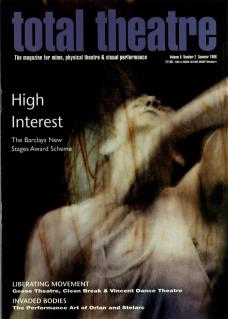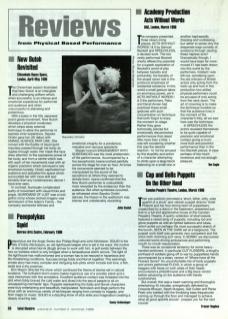The Chisenhale season illustrated that New Butoh is an intangible and challenging artform which, when successful, is an intense and emotional experience for performer and audience and when unsuccessful is alienating and pretentious.
With a basis in the 50s Japanese avant garde movement, New Butoh develops a physical vocabulary which strips away external technique to allow the performer to express inner experience. Sayoko Onishi gave her UK debut with Animal Science Part One. She moved with the fluidity of liquid gold impulses passed through her body as ripples through water. Her mask-like face drew attention to the expressive power of her body, and from a centre which was still, each of her movements rose with an organic precision which conveyed a rare emotional honesty. Onishi captivated her audience and activated the space which surrounded her with more skill and sincerity than any contemporary dancer I have ever seen.
In contrast, Sumosaki complicated purity of movement with visual tricks and props. Guardians of Lust was a lurid gothic romp whose cliched imagery was reminiscent of the Adam's Family – the company eschewed stillness and emotional integrity for a ponderous, macabre and vacuous spectacle.
Masaki Iwana's Engagement with Substances was the most problematic of the performances. Accompanied by a live saxophonist, Iwana lurched painfully across the stage for over an hour. At times his movements seemed to be manipulated by the sound of the saxophone at others they seemed to dictate them. Iwana confirmed that the New Butoh performer is undoubtedly more rewarded by the endeavour than the audience. But when symbiosis occurred, as witnessed when Sayoko Onishi danced, the frisson in the auditorium was intense and unbelievably rewarding.

